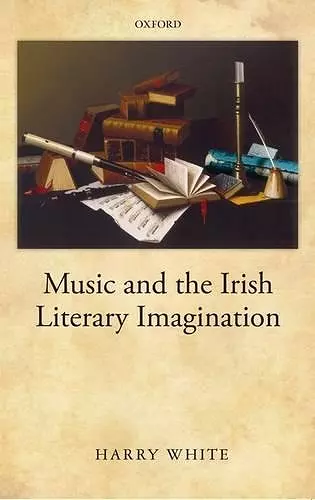Music and the Irish Literary Imagination
Format:Hardback
Publisher:Oxford University Press
Published:13th Nov '08
Currently unavailable, and unfortunately no date known when it will be back

Harry White examines the influence of music in the development of the Irish literary imagination from 1800 to the present day. He identifies music as a preoccupation which originated in the poetry of Thomas Moore early in the nineteenth century. He argues that this preoccupation decisively influenced Moore's attempt to translate the 'meaning' of Irish music into verse, and that it also informed Moore's considerable impact on the development of European musical romanticism, as in the music of Berlioz and Schumann. White then examines how this preoccupation was later recovered by W.B. Yeats, whose poetry is imbued with music as a rival presence to language. In its readings of Yeats, Synge, Shaw and Joyce, the book argues that this striking musical awareness had a profound influence on the Irish literary imagination, to the extent that poetry, fiction and drama could function as correlatives of musical genres. Although Yeats insisted on the synonymous condition of speech and song in his poetry, Synge, Shaw and Joyce explicitly identified opera in particular as a generic prototype for their own work. Synge's formal musical training and early inclinations as a composer, Shaw's perception of himself as the natural successor to Wagner, and Joyce's no less striking absorption of a host of musical techniques in his fiction are advanced in this study as formative (rather than incidental) elements in the development of modern Irish writing. Music and the Irish Literary Imagination also considers Beckett's emancipation from the oppressive condition of words in general (and Joyce in particular) through the agency of music, and argues that the strong presence of Mendelssohn, Chopin and Janácek in the works of Brian Friel is correspondingly essential to Friel's dramatisation of Irish experience in the aftermath of Beckett. The book closes with a reading of Seamus Heaney, in which the poet's own preoccupation with the currency of established literary forms is enlisted to illuminate Heaney's abiding sense of poetry as music.
[a] fascinating account * Angela Leighton, Times Literary Supplement *
[a] learned ambitious study... The book's importance lies less in its overall thesis - the grand symphonic structure - than in the chamber music - the close engagement with the musical dimension of the work of these writers which each chapter offers. * Terence Killeen, Irish Times *
Harry Whites Music and the Irish Literary Imagination is one of those rare, seismic books that shakes up and rearranges the ground beneath its readers. It is beautifully conceived and written: detailed, nuanced, eloquent, persuasive, and at times, very funny. * Rachael Sealy Lynch, New Hibernia Review *
The style is engaging and scholarly... a thoughtful,well-written...well-referenced piece of theoretical critique... White has written a supremely intelligent account of music, as an absent presence, in Irish literature * Eugene O'Brien, Journal of the Society for Musicology in Ireland *
a remarkable study * Ite O'Donovan, Irish Times *
Harry White's carefully wrought written style compels one to read slowly and savour the means of the expression as well as the argument. And it is richly rewarding to do so. This is a highly significant study that not only adds greatly to our understanding of twentieth-century Irish literary canon but also raises important questions about the role of music in modern(ist) literature more generally. * Aidan J. Thomson, Music and Letters *
Harry White works through delightfully persuasive explanations of the role and import of European music in the lives, works and language of Moore, Yeats, Shaw, Synge, Hoyce, Beckett, Friel and Heaney. And he does so with enough dexterity and more than enough knowledge and affection for both music and words to engage anyone with a passing aquaintance with either. * Cahal Dallat, Wasafiri *
a timely and important addition to this field and one that, in its focus, inverts this one-way direction of influence between literature and music. ...Harry White's carefully wroght written style compels one to read slowly and savour the mean of the expression as well as the argument. And it is richly rewarding to do so. This is a highly significant study that not only adds greatly to our understanding of the twentieth-century Irish literature canon but also raises important questions about the role of music in modern(ist) literature more generally. * Aiden J. Thomson, Music & Letters *
- Winner of Winner of the American Conference for Irish Studies' Michael J. Durkan Book Prize 2009.
ISBN: 9780199547326
Dimensions: 223mm x 144mm x 22mm
Weight: 477g
280 pages